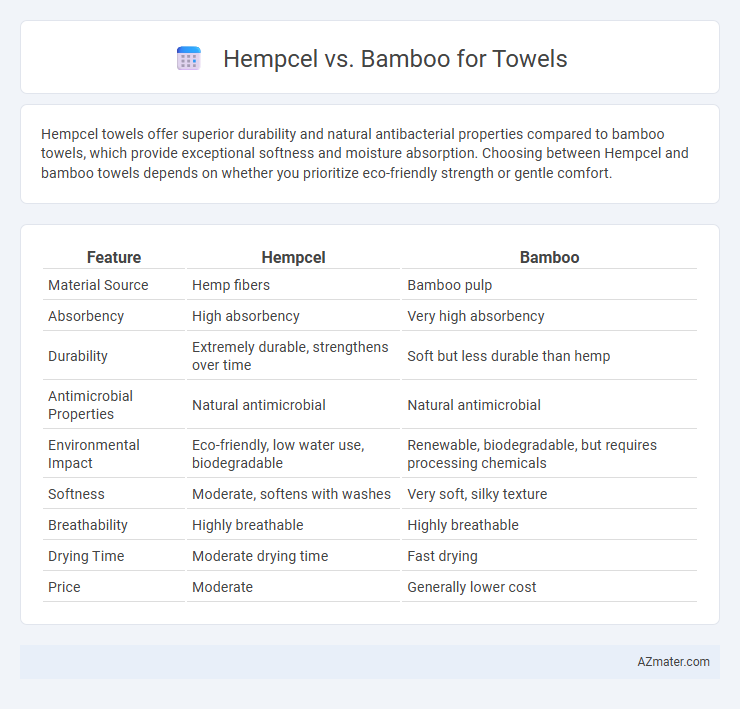Hempcel towels offer superior durability and natural antibacterial properties compared to bamboo towels, which provide exceptional softness and moisture absorption. Choosing between Hempcel and bamboo towels depends on whether you prioritize eco-friendly strength or gentle comfort.
Table of Comparison
| Feature | Hempcel | Bamboo |
|---|---|---|
| Material Source | Hemp fibers | Bamboo pulp |
| Absorbency | High absorbency | Very high absorbency |
| Durability | Extremely durable, strengthens over time | Soft but less durable than hemp |
| Antimicrobial Properties | Natural antimicrobial | Natural antimicrobial |
| Environmental Impact | Eco-friendly, low water use, biodegradable | Renewable, biodegradable, but requires processing chemicals |
| Softness | Moderate, softens with washes | Very soft, silky texture |
| Breathability | Highly breathable | Highly breathable |
| Drying Time | Moderate drying time | Fast drying |
| Price | Moderate | Generally lower cost |
Introduction to Hempcel and Bamboo Towels
Hempcel and bamboo towels offer eco-friendly alternatives to traditional cotton towels, known for their sustainability and durability. Hempcel towels are crafted from hemp fibers, prized for their natural antimicrobial properties and high absorbency, making them ideal for sensitive skin and long-lasting use. Bamboo towels feature soft, moisture-wicking bamboo viscose, which provides antibacterial benefits and exceptional softness while promoting renewable resource use.
Sustainability and Environmental Impact
Hempcel towels outperform bamboo in sustainability due to hemp's faster growth cycle, requiring less water and no pesticides, which significantly reduces environmental impact. Bamboo cultivation often involves intensive monoculture practices and chemical processing to make fibers, leading to habitat disruption and higher carbon emissions. Hempcel's biodegradable fibers also decompose more efficiently, promoting a circular economy in textile production.
Material Sourcing and Production Processes
Hempcel towels are crafted from sustainably cultivated hemp, which requires minimal water and no pesticides, promoting eco-friendly material sourcing. Bamboo towels derive from fast-growing bamboo plants, often harvested without chemicals, though some production involves viscose processing that can impact environmental safety. Hempcel production emphasizes mechanical processing that preserves fiber strength and reduces chemical use, while bamboo towel manufacturing may include chemical treatments to soften fibers, affecting overall sustainability.
Softness and Comfort Comparison
Hempcel towels are known for their durability and natural antimicrobial properties but tend to feel coarser compared to bamboo towels, which offer superior softness and a silky texture ideal for sensitive skin. Bamboo fibers have a natural moisture-wicking ability that enhances comfort by keeping the skin dry and cool, whereas hempcel's rougher texture may require several washes to soften. For those prioritizing immediate softness and luxurious comfort, bamboo towels generally provide a more pleasant tactile experience than hempcel options.
Durability and Longevity
Hempcel towels exhibit superior durability and longevity compared to bamboo towels due to their tightly woven fibers and natural resistance to wear and tear. Hemp fibers are known for their strength, making Hempcel towels less prone to fraying and thinning over time. Bamboo towels, while soft and eco-friendly, tend to lose their plushness quicker and display signs of pilling sooner than Hempcel alternatives.
Absorbency and Drying Performance
Hempcel towels exhibit superior absorbency due to hemp fibers' natural ability to wick moisture efficiently, often outperforming bamboo towels in holding liquid. Bamboo towels, while also highly absorbent, tend to dry faster because of their lightweight fiber structure and breathability. The combination of hempcel's strong moisture retention and bamboo's quick-drying properties makes hempcel ideal for heavy absorbency needs, while bamboo suits users seeking rapid towel drying times.
Hypoallergenic and Skin Sensitivity
Hempcel towels offer superior hypoallergenic properties due to their natural antimicrobial and mold-resistant fibers, making them ideal for sensitive skin prone to irritation. Bamboo towels also provide excellent softness and moisture-wicking capabilities but may contain chemical residues from processing, which can trigger allergic reactions in highly sensitive individuals. Choosing Hempcel towels ensures a safer, irritation-free experience with enhanced breathability and durability for delicate skin types.
Cost and Value for Money
Hempcel towels typically cost more upfront due to the durable and eco-friendly hemp fibers, offering long-term value through their exceptional longevity and antimicrobial properties. Bamboo towels are generally more affordable and provide softness and absorbency, making them a cost-effective choice for everyday use. Evaluating cost against durability and performance, hempcel towels deliver superior value for money despite the higher initial investment.
Maintenance and Care Requirements
Hempcel towels require minimal maintenance due to their natural resistance to bacteria and mildew, making them easy to wash and quick-drying without losing softness. Bamboo towels also offer low-maintenance care, as their antimicrobial properties reduce odor buildup and they can be machine washed on gentle cycles to preserve fiber integrity. Both materials benefit from avoiding fabric softeners and high heat drying to maintain durability and absorbency over time.
Consumer Reviews and Market Trends
Hempcel towels receive high praise in consumer reviews for their durability, eco-friendliness, and superior absorbency, making them a popular choice among environmentally conscious buyers. Bamboo towels are frequently lauded for their softness and natural antimicrobial properties, attracting consumers seeking gentle yet hygienic options for sensitive skin. Market trends indicate a growing preference for hemp-based textiles due to sustainability concerns, while bamboo remains favored for luxury bath linens, reflecting diverse consumer priorities in the towel market.

Infographic: Hempcel vs Bamboo for Towel
 azmater.com
azmater.com